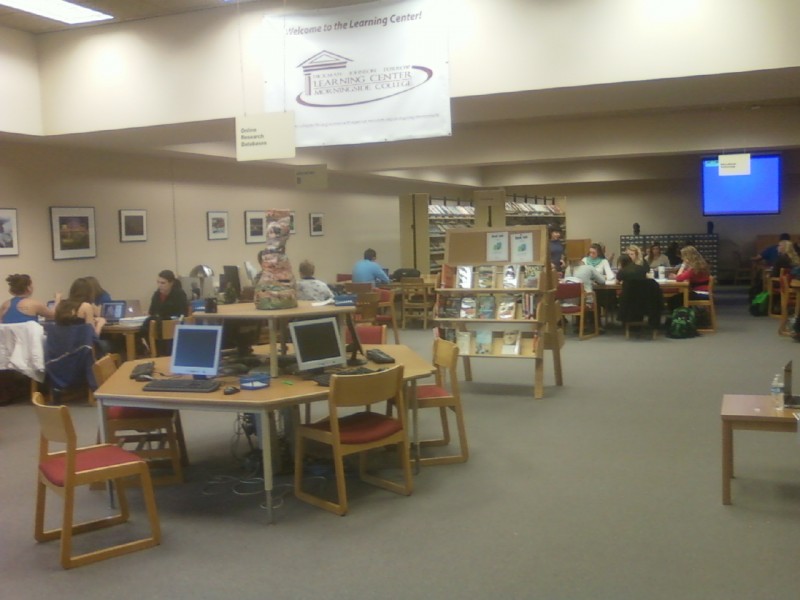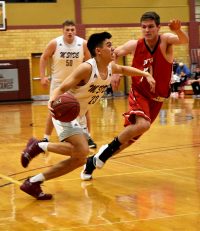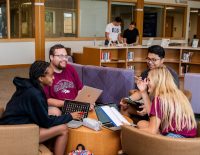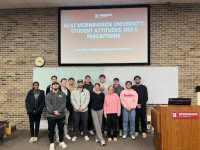By Gustav Hollnagel–
 Doing hands-on research on campus has become more and important and encouraged by the college and by faculty. The biology, physics, and psychology departments now have requirements either in classes or senior theses to immerse one’s self into research.
Doing hands-on research on campus has become more and important and encouraged by the college and by faculty. The biology, physics, and psychology departments now have requirements either in classes or senior theses to immerse one’s self into research.
I have been doing quite a bit of research work myself, and it’s not always an easily managed process. It requires organization, commitment, patience and discipline.
Librarian Jim Fisk said, “You first start a process and it seems like ‘I’ll never be able to do this’. But then it becomes you, like a part of you. Your mind is never really at rest, but that depends on the scope of research and personality of the student I suppose.“
When I started this semester, I had two big-time research projects to do. I found myself freaked out at times and emotionally challenged to remain focused. Of course, getting started was one of the biggest challenges.
Fisk said, “Sometimes students will wait longer than they should to start.” Then they may go seek Fisk for his library services. “Most come when they don’t know what to do and they’re stuck,” Fisk explained.
Another issue with doing research is to set a goal that is attainable for you. Dr. John Pinto said, “I have observed student research and what I am most concerned about is the Einstein syndrome, the idea that the research has to be definitive. Students may not understand that 99 percent of research is just one brick in the wall. It’s about community and a learning process.”
It has been a great deal of learning for me too this semester. It used to feel like research was something tedious and something that most of us may be inexperienced in.
 Pinto said research is “creative in terms of ideas first, but it’s really a very logistic approach and it’s tedious of course.” He explained it involves a literary review, a specific design, collecting data, analyzing data, and writing results in appropriate format. “It takes both left and right brain to do very good research,” Pinto said.
Pinto said research is “creative in terms of ideas first, but it’s really a very logistic approach and it’s tedious of course.” He explained it involves a literary review, a specific design, collecting data, analyzing data, and writing results in appropriate format. “It takes both left and right brain to do very good research,” Pinto said.
Dr. Susan Burns, associate dean for academic affairs, explained, “When I was a student I didn’t necessarily see research in a good way. But then I fell in love with it. It fosters your ability to think analytically.”
Burns pointed out that the challenges to hands-on research on campus lie in the ability to get a big enough sample size, and coming up with the research design might be the hardest thing overall. Of course, she also said, “It’s a time commitment and the writing part of it can be a lot to handle, unless you love writing.”
The student population that carries out research on campus has steadily been growing, partly thanks to the annual Palmer Symposium and other research-facilitating events or intradepartmental requirements.
Pinto said, “It’s heartening to see how much is being done. It’s really nothing more than problem solving, just sophisticatedly. Research is not just for a few disciplines. I am most pleased with the change towards a more research-oriented campus.”
Burns agreed, “When I came to Morningside we did research, but now its actually part of our organizational culture here. Students are expected to carry out research.”
The emotional and cognitive challenges of doing research can certainly be a reason why not everyone is made for a huge research project, but everyone can do research in any scope, shape or form.
 Fisk encourages students to come have a conversation with the librarians if you want to get started or face hard times during the research process. “Sometimes interests may change when students talked to us, they regain clarity and focus. Some students seem to have a belief that books are the best source for them, but if you come and just ask for help, we can find articles, save time, and we’ll teach people,” Fisk said.
Fisk encourages students to come have a conversation with the librarians if you want to get started or face hard times during the research process. “Sometimes interests may change when students talked to us, they regain clarity and focus. Some students seem to have a belief that books are the best source for them, but if you come and just ask for help, we can find articles, save time, and we’ll teach people,” Fisk said.
He added, “We’re all in the same boat together. We co-depend on each other. What might be tough for students might not be easy for us. There’s always stuff to find. And once you get used to it it’s fun.”
And indeed, once you get used to the process and you have an attainable goal paired with a good time-management strategy, it becomes your (research) baby.
Burns has supervised many thesis works, individual and group research. She said, “You’ve got the fall to get stuff done, but conferences to present are in the spring. The spring is usually for the write-up, analyses and presentation. Writing can be something unenjoyable, but I absolutely loved presenting.”
After countless hours of doing research myself, I have to agree with my interviewees. Research is a tough process, but it’s also a learning process. There are always things to take away from it. Plus, when you do it for your own progress, it really does become more interesting and valuable. At least to me it did. Take on the challenge and go seek help if you need to. Dr. Pinto has helped me out a great deal, and I found many of my sources through library support.
Oh and one more thing, try to support each other in research. This may be socially to cope with all the associated stress, or simply by participating in your peers’ work. College is truly about community and solidarity – take a little but always be sure to give as well… ‘Tis the season after all.
—






Leave a Reply